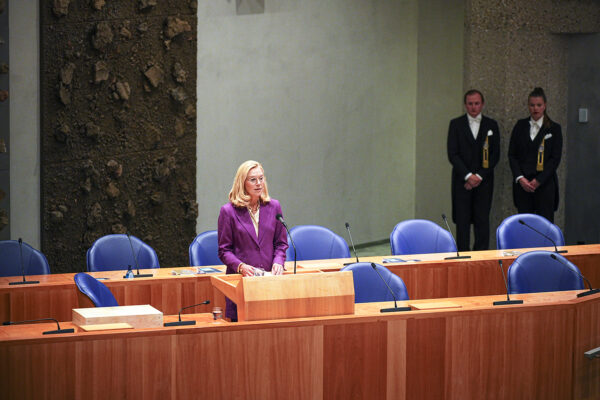
The Dutch government will cap electricity and gas prices.
King Willem-Alexander announced the measures, which replace an energy tax discount, during the state opening of parliament in The Hague.
The Netherlands until recently opposed price caps in Europe, arguing they disincentivize energy conservation.
Lower fuel taxes will remain in place until the middle of next year.
Dutch pay highest prices
The Dutch pay the highest electricity and gas prices in Europe, and the highest fuel prices after the Nordic countries and Greece.
The Netherlands’ Central Bureau of Statistics estimated that rising prices — inflation reached a postwar record of 13.6 percent in August — could push 1.2 out of 17.7 million people into poverty.
The government’s proposal is to cap the price of electricity at 70 eurocents per kilowatt-hour (down from a market price of 83 cents) up to a use of 2,400 kWh per year, and the price of gas at €1.50 per cubic meter (now €3.60) up to 1,200 m³.
Average household consumption is 3,500 kWh of electricity and 1,500 m³ of gas. Consumers would pay market rates for higher use to still make it worthwhile to insulate old homes and conserve energy.
The government is studying how to help small and medium-sized businesses. Large fossil fuel companies would pay a higher mining tax to finance the energy price caps, which are projected to cost at least €5 billion.
€16 billion in relief
The price caps come on top of €16 billion in measures to offset high living costs that leaked two week ago and were raised to €17 billion in the king’s speech:
- Increase the personal allowance.
- Reduce tax on incomes under €70,000 by .1 percent.
- Increase the minimum wage by 10 percent, from €11.26 to €12 per hour.
This automatically raises pensions and welfare benefits as well.
- Lower rents in social housing.
- Increase child benefits.
- Increase rental assistance by around €200 per year.
- Increase health-insurance benefits (only this year) by €412.
- Increase student aid by almost €2,000 per year.
Child, rental and health-insurance benefits are tied to income, and usually phase out above €32,000.
- Give low-income households a €1,300 bonus.
Households with earnings up to 120 percent of welfare (€1,266 per month) qualify.
More money for defense and schools
In addition, the government is raising spending on defense by €5 billion, to meet NATO’s 2-percent-of-GDP target, and on education by €2.8 billion.
To pay for the spending increases, capital gains tax will rise from 31 to 34 percent, although the threshold at which the tax kicks in is raised from €50,000 to €57,000. Corporate tax will rise from 15 to 19 percent.
The government’s total budget for next year is €395 billion, out of which €29 billion (3 percent of GDP) will be borrowed assuming 1.5 percent economic growth.
